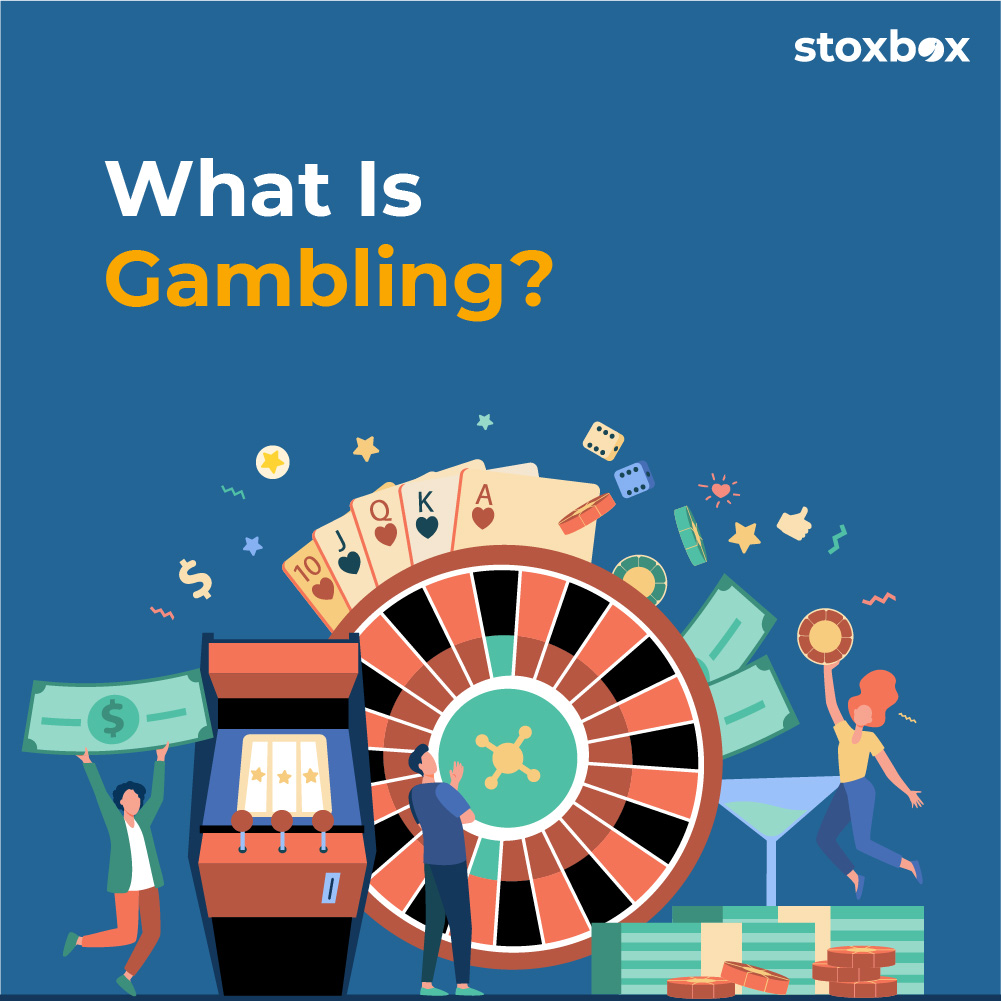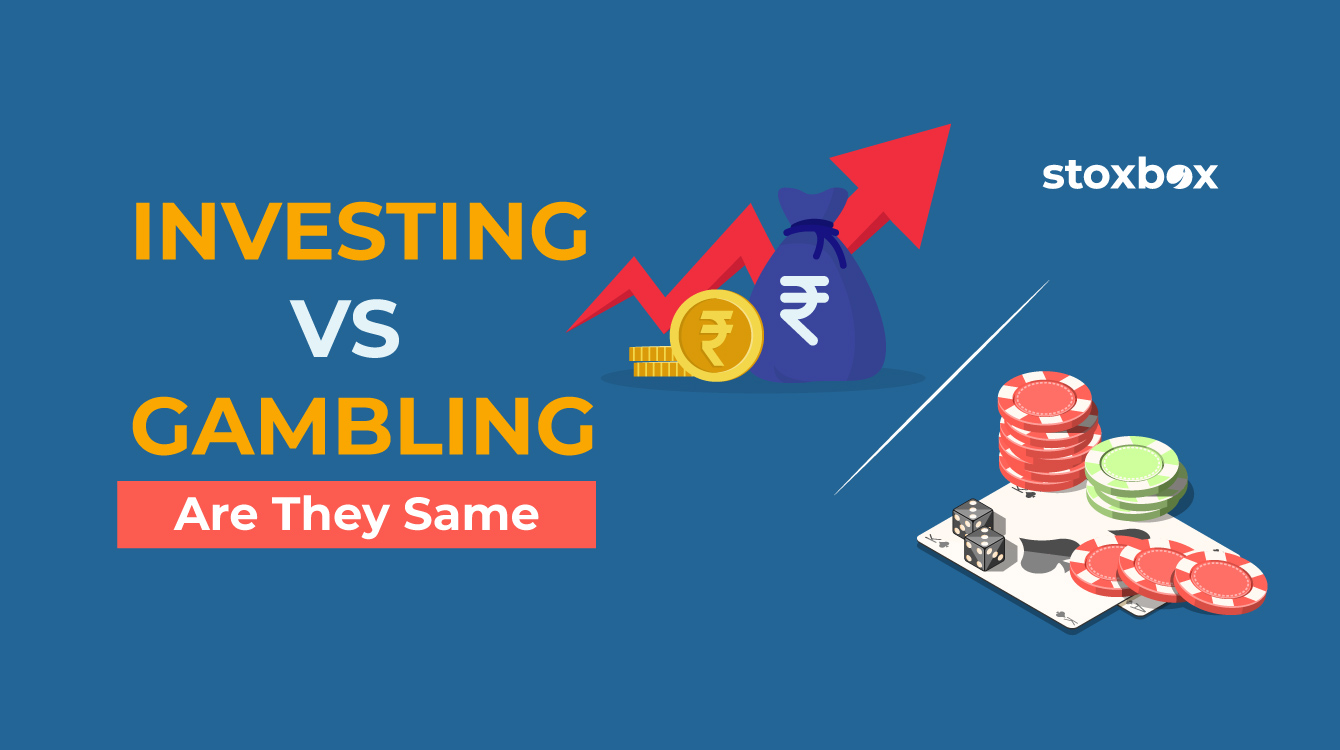Have you ever wondered if putting money into the stock market is just another form of gambling? Many people struggle with this thought, especially when they hear stories of huge losses or quick wins in the market. It’s easy to see why some confuse investment vs gambling, as they both involve risks, and the outcomes can sometimes feel unpredictable.
But here’s the truth: gambling is a game of pure luck, while investing is a calculated process grounded in research and strategy. Unfortunately, this misunderstanding often holds people back from making informed decisions about their finances.
If you’ve been hesitant to invest because you fear losing money or believe it’s just a gamble, this post will help clear the air and show you why investing can be your ticket to long-term financial growth.
The first and foremost question that we all have is: are they the same?
What is Gambling?

Gambling is all about taking chances with money in the hope of winning big. It’s driven purely by luck, with little to no control over the outcome. Whether it’s placing a bet on a cricket match, spinning the roulette wheel at a casino, or buying a lottery ticket, gambling thrives on uncertainty.
Unlike investing, where decisions are based on thorough research and analysis, gambling doesn’t require much strategy, it’s a matter of luck, plain and simple.
A common question many people ask is, Is buying stocks gambling? This confusion arises because some investments, like speculative trades, might appear similar to gambling.
For example, examples of speculative investments, such as options trading or penny stocks, often involve higher risks and shorter time horizons, which might feel like gambling to the uninformed.
However, the key difference is that speculative investing still allows room for research and educated decisions, unlike pure gambling, where the odds are stacked against the player.
Ultimately, gambling doesn’t offer a consistent or reliable path to wealth. Instead, it often leads to impulsive decisions and financial stress, making it a risky approach for those looking to grow their money.
What is Investing?

Investing is a disciplined and methodical approach to building wealth. Unlike gambling, which relies on chance, investing is all about making informed decisions backed by research, planning, and a clear vision for the future.
It’s a process that involves understanding your financial goals, evaluating risks, and allocating money to assets like stocks, bonds, or mutual funds to grow wealth over time.
One of the key elements of investing is focusing on measurable outcomes like the return on investment, which helps you track how your money is growing.
For example, a good investor may follow a stock profit taking strategy, ensuring they secure gains at the right time while minimizing unnecessary risks. This is especially important for those managing high-risk high-return investments, where careful analysis and timing can make all the difference.
Successful investors often develop habits that guide their decisions. The habits of successful investors include staying patient during market fluctuations, diversifying their portfolio, and thinking long-term instead of chasing quick gains.
While the stock market may seem unpredictable at times, a smart investor uses tools and strategies to make decisions based on data rather than emotion.
This is what sets investing apart from gambling, it’s a structured and thoughtful process aimed at achieving financial stability and growth.
But Wait! What About Speculating?
Is It the Same as Gambling?
Speculation in the stock market means trading high-risk financial instruments to realise substantial returns. When price movements of securities are frequent and volatile in the market, traders try to take the maximum advantage of the situation by calculative speculation.
Investing may seem like a gamble to an outsider. But those who participate in stock market trading with adequate knowledge and make it their business base their decisions on information rather than intuition!
Core Differences Between Investing and Gambling
Understanding the core differences between investing and gambling can help you make better financial decisions. While both may involve risks, their processes, outcomes, and purposes couldn’t be more different. Let’s break it down step by step:
Decision-Making: Strategy vs Speculation
Investing is a calculated process where every decision is based on thorough research, market trends, and financial goals. Investors carefully analyze data, study companies, and evaluate risks before putting their money into assets.
For instance, someone investing in stocks might consider a company’s performance history, potential growth, and current market conditions.
Gambling, on the other hand, relies entirely on speculation and luck. Whether it’s betting on a horse race or playing cards, gamblers have little to no control over the outcome.
This speculative nature leads to questions like is options trading gambling? or share market is gambling? While speculative investments, like day trading, may appear similar to gambling, the difference lies in the ability to base decisions on analysis and trends rather than relying solely on chance.
Risk vs Reward: Calculated vs Unpredictable
Investors take calculated risks to earn returns, understanding that not every investment will result in profits. They often pursue high-risk high-return investments, such as tech stocks or new startups, with the understanding that potential losses are part of the process.
However, these risks are managed by diversifying investments and adopting strategies like a stock profit taking strategy to lock in gains.
In gambling, the risks are often uncontrollable, and the rewards are unpredictable. A gambler placing a bet has no assurance of return and often faces the possibility of losing everything in one go.
This difference highlights the contrast between investment vs gambling, where investing focuses on steady, measurable growth, and gambling offers fleeting moments of success with no long-term benefits.
Time Horizon: Long-Term vs Instant Gratification
One of the biggest differences is the time frame involved. Investing is a long-term activity where patience pays off.
Investors often aim to grow their money steadily over the years by following principles like the best way to invest your salary or deciding how much to invest per month to achieve their financial goals.
The power of compounding and long-term planning makes investing a reliable path to wealth creation.
Gambling, on the other hand, is all about instant gratification. The outcome is determined within minutes or hours, with no potential for ongoing growth.
This short-term focus often leads to impulsive decisions, unlike investing, which rewards those who stay the course.
Common Misconceptions: Is the Stock Market Gambling?
Many people hesitate to invest because they believe the stock market is unpredictable and risky. However, understanding the truth behind these misconceptions can help you see why investing when done right, is far from gambling.
Misconception 1: Investing is Purely Luck-Based
- Reality: Unlike gambling, investing involves data-driven decisions. Investors analyze trends, company performance, and economic conditions to make informed choices.
Questions like is stock market gambling? or is investing gambling? come from this myth, but smart investment practices show that knowledge and strategy lead to success.
Misconception 2: Day Trading is the Same as Gambling
- Reality: While day trading has a high-risk element, it isn’t gambling. Traders use charts, technical analysis, and strategies to make educated guesses. However, it is more speculative than long-term investing.
Many ask, Is day trading like gambling? The key difference lies in preparation and risk management, which gambling doesn’t offer.
Misconception 3: Volatile Markets Mean Losses
- Reality: Volatility doesn’t always equal risk. With the right approach, such as tips for investing during volatile markets, investors can take advantage of market fluctuations to buy low and sell high.
Using tools and techniques during market swings can help investors avoid emotional decisions and focus on their long-term goals.
Misconception 4: Buying Stocks is No Different from Gambling
Reality: Many believe that buying stocks is the same as placing a bet because outcomes can vary. However, purchasing stocks is not gambling when done with proper research. When you buy a stock, you’re purchasing a share of a company’s ownership, which can grow in value as the company performs well. Unlike gambling, this growth depends on real-world factors like revenue, innovation, and market demand, not luck.
Questions like, Is buying stocks gambling? arise from this misunderstanding. The truth is that stocks represent actual assets that can generate returns, while gambling provides no ownership or long-term potential.
How to Approach Investing Wisely
Investing doesn’t have to feel overwhelming. With the right mindset and strategies, you can build a strong foundation for financial success. Let’s look at practical steps that can help you start investing the smart way.
Set Clear Financial Goals
Before you start, think about what you want to achieve with your investments. Are you saving for a home, building a retirement fund, or looking to grow your wealth? Clear goals will guide your investment choices and help you stay focused.
For example, knowing how much to invest per month based on your salary ensures you stay on track toward your financial objectives.
Adopt a Salary-Based Investment Strategy
The best way to invest your salary is to allocate a fixed percentage of your monthly earnings toward investments. Many experts recommend the 50-30-20 rule: 50% for needs, 30% for wants, and 20% for savings and investments.
Consistently setting aside funds, even in small amounts, can create a significant wealth-building habit over time.
Diversify to Minimize Risk
Putting all your money into a single investment can be risky. Instead, spread your investments across various asset classes like stocks, bonds, and mutual funds. Diversification reduces the impact of market fluctuations, making your portfolio more stable.
For example, using smart investment tools can help you identify the right mix of assets to suit your risk tolerance.
Think Long-Term, Not Short-Term
Investing works best when you think long-term. Short-term market movements can cause anxiety, but staying committed allows your investments to benefit from compounding over time.
By focusing on strategies aligned with your goals, you’ll see better results and avoid unnecessary stress.
Why Gambling is Not a Reliable Wealth-Building Strategy
While gambling might seem like an exciting way to make quick money, it lacks the structure and potential for consistent growth that investing offers. Let’s understand why it isn’t a dependable way to achieve financial goals.
Inconsistent Returns
Gambling doesn’t guarantee any measurable returns and is entirely based on chance. Unlike investing, which follows structured strategies like a stock profit taking strategy, gambling leaves outcomes to luck. This lack of predictability makes it unsuitable for long-term wealth building.
Emotional Decisions Lead to Losses
Gambling often encourages impulsive and emotional decisions, causing individuals to lose more than they gain. Speculative activities in markets, such as gambling stocks, share similar risks, especially when decisions are made without proper analysis or understanding.
SEBI’s Data on Losses in Speculative Trading
A study conducted by SEBI revealed that 93% of individual traders in equity futures and options between FY22 and FY24 suffered losses. These losses amounted to a staggering ₹1.8 lakh crore over three years. This highlights how speculative activities in the market resemble gambling and often result in significant financial setbacks for individuals.
Building Assets, Not Chasing Wins
Investing focuses on asset-building and growing wealth over time. It allows individuals to make informed decisions, consider knowledge like tips for investing during volatile markets, and benefit from long-term planning. Gambling offers none of these advantages, making it an unreliable approach to financial success.
Inspiration Through Investment Quotes
A thoughtful quote can often provide clarity and motivation when it comes to making smart financial decisions. Here’s one that resonates with the topic of investing versus gambling:
“Risk comes from not knowing what you’re doing.” – Warren Buffett
This quote underscores the difference between calculated investing and gambling. While gambling thrives on uncertainty and chance, investing rewards knowledge, research, and informed decision-making.
Reflecting on such investment quotes can help you focus on strategies that build wealth sustainably rather than relying on luck.
Let these words serve as a reminder that the right approach to investing is grounded in understanding, not speculation.
Conclusion
Investing and gambling may appear similar on the surface, but their differences are vast. While gambling relies solely on luck and chance, investing is a calculated approach based on research, strategy, and long-term goals. By understanding these differences, you can make more informed financial decisions and take control of your wealth-building journey.
If you want to grow your money thoughtfully, adopting smart investment strategies and following the habits of successful investors can create a way for steady progress. For instance, if you’re looking to gain equity exposure, you can choose to invest directly in the stock market, explore equity mutual funds, or opt for curated portfolios like an equity Stoxbox.
Stoxbox provides a range of services for investors, including stock tips with StoxCalls, seamless mutual fund investments, Utilities like SIP calculators and lump sum calculators, and access to trading platforms for effortless market participation. Whether you’re a beginner or an experienced investor, Stoxbox offers guided solutions tailored to your needs.
Make investing a part of your financial journey and take the first step toward growing your wealth today. Explore Stoxbox to get started!
Frequently Asked Questions
1. Can speculative investments like options trading be considered gambling?
No, speculative investments like options trading are not gambling if approached with knowledge and strategy. While options trading involves risk and may seem speculative, it allows investors to make informed decisions based on market data, trends, and strategies. However, treating options trading impulsively or without proper understanding can make it feel similar to gambling.
2. How can I differentiate between a risky investment and gambling in the stock market?
A risky investment involves calculated risks backed by research and a potential for long-term gains. Gambling, on the other hand, is based purely on chance with no underlying value creation. For instance, high-risk high-return investments like startups can yield rewards if evaluated properly, whereas placing bets without any research mirrors gambling.
3. Why do most individual traders lose money in speculative markets like futures and options?
According to SEBI, 93% of individual traders in equity futures and options between FY22 and FY24 incurred losses, totaling ₹1.8 lakh crore. The primary reasons include lack of knowledge, overtrading, and emotional decision-making, which are traits commonly associated with gambling rather than disciplined investing.
4. Are mutual funds safer than directly investing in stocks when compared to gambling risks?
Yes, mutual funds are generally safer than direct stock investments because they diversify risk by pooling money across a variety of assets. This reduces the chance of significant losses, unlike gambling, which offers no protection against risk. Tools like SIPs in mutual funds help you invest systematically over time, providing stability and discipline.
5. What steps can I take to avoid treating the stock market like gambling?
To avoid treating the stock market as gambling, start by educating yourself on fundamental and technical analysis, diversify your portfolio, and set clear financial goals. Avoid speculative trades without research and focus on long-term growth strategies. Solutions like Stoxbox can help you make informed decisions with guided investment options.
6. How does emotional investing compare to gambling behavior?
Emotional investing, like panic selling or impulsive buying, mirrors gambling behavior because it’s driven by feelings rather than logic. Gambling thrives on emotional highs and lows, whereas successful investing requires a rational approach and patience to avoid reacting to short-term market fluctuations.
7. Is day trading closer to investing or gambling?
Day trading can resemble gambling when executed without research or strategy, as it relies on quick market movements. However, professional day traders use technical analysis, risk management, and a disciplined approach, which separates it from gambling. It’s important to have a deep understanding of market trends to succeed in day trading.
Your Wealth-Building Journey Starts Here

You might also Like.
No posts found!
